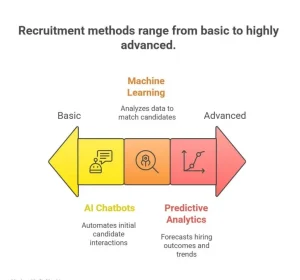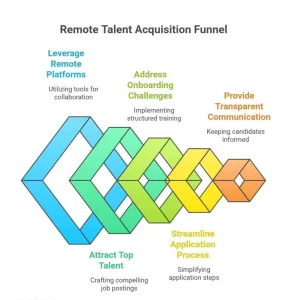The business landscape evolves with the field of recruitment. Especially for new startups that aim to carve out their niche in competitive markets. However, it is crucial to predict the future of recruitment. For this, understanding emerging trends and innovations is necessary. As it can shape how startups attract, engage, and retain top talent. With the technology advancements to shifts in candidate expectations and organizational needs, staying ahead of these trends is important for startups. Specifically for those seeking to build dynamic and effective teams.
The blog is written to explore key future recruitment trends. The ones that are poised to impact startups. It provides insights into how they can adapt and thrive in an ever-changing hiring environment. Top of Form Bottom of Form
AI-Driven Recruitment for Businesses: The New Normal
AI-driven recruitment is becoming an indispensable tool for companies. Especially those who aim to streamline their hiring processes and secure top talent. AI technologies are transforming traditional recruitment methods. It introduces innovations such as AI chatbots for initial screening. On the other hand, machine learning can be used for precise candidate matching. Additionally, predictive analytics to forecast hiring success.
These advancements enhance the efficiency of the recruitment process. But it also improves the candidate selection accuracy. This ensures a better fit between employees and organizational needs. Embracing AI in recruitment is a trend. Also, it’s a strategic move towards optimizing hiring practices. While helping to stay competitive in a dynamic job market, Top of Form Bottom of Form
AI Chatbots for Initial Screening
AI chatbots are revolutionizing the recruitment process. This can be done by handling initial candidate interactions. It conducts preliminary screenings, answers frequently asked questions, and gathers essential information from applicants. Thereby streamlining the early stages of recruitment in UAE. This automation speeds up the hiring process. But it also ensures a consistent and unbiased approach to initial candidate evaluation.
Machine Learning for Candidate Matching
Machine learning algorithms are enhancing candidate matching by analyzing vast amounts of data. This helps in identifying the best fit for specific roles. The algorithms assess skills, experience, and cultural fit by comparing candidate profiles against job requirements and company needs. This data-driven approach improves the accuracy of candidate selection and reduces the time spent on manual screening.
Predictive Analytics for Hiring Success for Businesses
Predictive analytics leverages historical data and advanced algorithms. This aids in forecasting hiring outcomes and trends. Businesses predict the success of potential hires by analyzing patterns from past hiring processes. Identify key factors that influence employee performance. Make informed decisions about recruitment strategies. This approach helps companies optimize their hiring practices and improve overall recruitment efficiency.

Remote Work and Global Talent Pools
Remote work has revolutionized access to global talent pools. It can be granted by allowing companies to tap into a geographically dispersed workforce. Without being constrained by location. This enables organizations to find specialized skills and cultural perspectives. Particularly, that may not be available locally. It fosters innovation and expands their competitive edge. It also requires effective remote management practices and strategies to address:
- Time zone differences
- Communication barriers, and
- Varying local regulations.
Leveraging Remote Work Platforms
Remote work platforms have revolutionized business operations. This can be done by facilitating collaboration and communication across geographically dispersed teams. However, tools such as:
- Video conferencing
- Project management software, and
- Cloud-based file sharing
It enables companies to manage remote employees efficiently regardless of their location. Businesses maintain productivity while availing of global talent by leveraging these platforms.
Attracting Top Talent from Anywhere in the World
The remote work shift has expanded access to the highly skilled global talent pool. Companies can now attract top talent from across the globe. Gaining access to a broader range of expertise and perspectives. Businesses should craft compelling job postings. This helps in capitalizing on this opportunity by offering:
- Competitive compensation packages and
- Highlight the remote work benefits. This appeals to the best candidates.
Addressing Challenges of Remote Onboarding and Management
Remote work offers numerous advantages. It presents challenges in onboarding and managing new hires. However, effective remote onboarding requires:
- Clear communication
- Structured training programs, and
- Regular check-ins to integrate new employees smoothly into the company culture.
Businesses need to establish robust performance metrics for ongoing management. Fostering virtual team-building activities is a plus. Utilize management tools to monitor progress and maintain engagement. Addressing these challenges proactively. Making sure that remote teams remain productive and cohesive.

Candidate Experience: The Competitive Edge
Delivering an exceptional candidate experience is a game-changer for companies. It is essential to attract and hold on to top talent. A positive candidate experience amplifies your employer brand. It also makes quite a difference when candidates make their decisions on whether or not to accept the offer. Streamlining the application process means there will be fewer hassles with the candidate application process, thus easier to complete.
On the other hand, with transparent communication, they are always kept informed and engaged through each stage. You can create a positive journey, right from the initial contact down to interviews and finally onboarding. It reflects your company’s values and commitment to excellence. Ultimately, it sets you apart from the competition and helps you build a stronger team.
Streamlining the Application Process
An efficient application process is crucial for attracting top talent. For this, simplify your application forms and minimize unnecessary steps. While making sure that the process is mobile-friendly. By making it easy for candidates to apply, you enhance their experience. It also increases the likelihood of engaging high-quality applicants.
Providing Transparent Communication
Clear communication is key to a positive candidate experience. You should keep candidates informed at every stage of the recruitment process. From application receipt to final decision, it is essential to inform them. Additionally, providing feedback, setting clear expectations, and being responsive to inquiries are important. It helps to build trust and demonstrate that you value their time and effort.
Creating a Positive Candidate Journey
A seamless candidate journey can set your company apart from competitors. From a welcoming initial contact to a thoughtful interview process. Along with smooth onboarding, every touchpoint should reflect your company’s values and culture. A positive candidate experience attracts top talent. It also enhances your employer brand. While it increases the likelihood of successful hires.
Conclusion
On looking towards the future of recruitment for new startups, it is clear that adaptability and innovation will be essential. As the rise of AI and automation is transforming. This entails how we source, screen, and engage with candidates. It enables a more personalized and efficient hiring process.
The increasing emphasis on diversity, equity, and inclusion is reshaping recruitment strategies. As a result, it ensures that startups build more inclusive and dynamic teams. Additionally, remote work and flexible arrangements are also becoming crucial factors. Especially in attracting top talent, reflecting broader changes in work culture.
FAQ
What is the future of AI in recruitment?
The future of AI in recruitment is increasing. It enhances candidate sourcing, screening, and matching. Leading to efficient and personalized hiring processes. AI also enables predictive analytics to anticipate hiring needs. It also assists in optimizing workforce planning. Ensure the ethical use of AI and mitigate biases. As it will be crucial as AI becomes more integral to recruitment strategies.
What is the future of recruitment in Dubai?
In this way, digital transformation and AI-enabled processes that improve efficiency and enhance the candidate experience will characterize the future of recruitment in Dubai. On the contrary, the attrition of world-class, top international talent that can help power ambitious growth and diversification plans of the city will remain strong. In other words, in a nutshell, the strategy of recruitment will fall in line with Dubai’s changing regulatory environment and the drive for sustainability.
How are recruiters using AI?
Recruiters are leveraging AI to streamline candidate sourcing and screening. This can be done by automating resume parsing and matching candidates to job descriptions. AI-driven tools also facilitate more personalized candidate engagement. The AI tools can be utilized for predictive analytics to forecast hiring needs. In addition to this, AI helps in reducing biases through data-driven decision-making processes.



